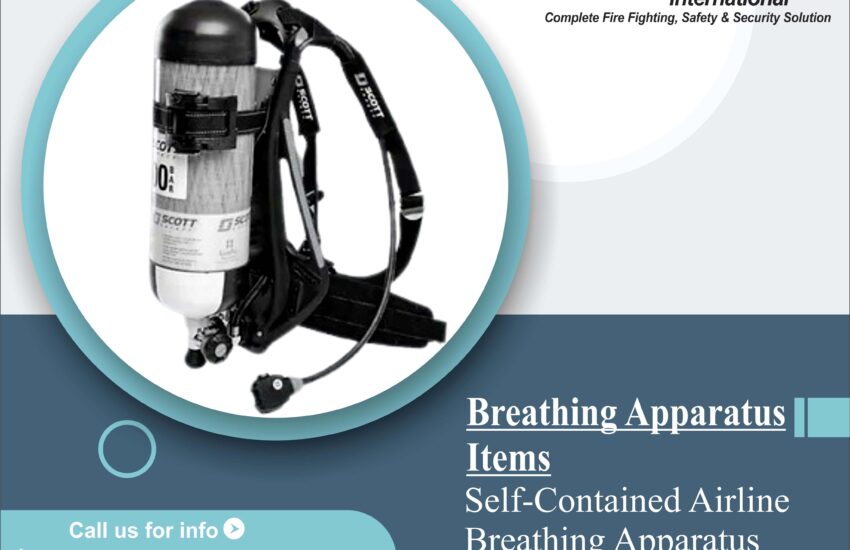Self-Contained Airline Breathing Apparatus Whether you’re entering a confined space, responding to a fire, or cleaning industrial tanks, having the right breathing apparatus can mean the difference between safety and serious risk. This guide explores three primary systems — Escape Breathing Apparatus (EBA), Self-Contained Breathing Apparatus (SCBA), and Self-Contained Airline Breathing Apparatus all designed to protect workers in hazardous, toxic, or oxygen-deficient environments.
🔸 Escape Breathing Apparatus (EBA)
An Escape Breathing Apparatus is a self-contained system intended for emergency self-rescue when conditions unexpectedly become hazardous. Commonly used in confined spaces, this system is not for entry into a dangerous atmosphere, but to provide safe exit should conditions deteriorate.
Key Features:
- Includes a small compressed air cylinder, typically 2.0L or 3.0L
- Air is supplied to either a tight-fitting positive pressure face mask or a loose-fitting hood
- Loose hoods are ideal for users with facial hair or glasses
- Fast donning in emergencies ensures quick escape
Best For:
- Confined space entries with potential risk
- Industrial sites where atmospheric changes may occur unexpectedly
- Users needing rapid escape tools
🔸 Self-Contained Breathing Apparatus (SCBA)
The Self-Contained Breathing Apparatus (SCBA) — also known as Compressed Air Breathing Apparatus (CABA) — is built for entry into known hazardous environments. Firefighters and emergency teams widely use this system to navigate through smoke, toxic gases, or oxygen-deficient areas.
Components:
- Compressed air cylinder (e.g., 9.0L at 200 bar for ~35 minutes)
- Backplate and pressure reducer system
- Face mask with medium-pressure air feed
Advantages:
- Full mobility and independent air supply
- Suitable for short-term hazardous entry
- Available in various cylinder sizes to match task duration
Limitations:
- Limited by air supply time
- Can restrict movement due to size and weight
- Requires frequent refills or cylinder changes
🔸 Airline Breathing Apparatus (ABA)
The Airline Breathing Apparatus connects the user to a remote air source via a durable hose. Unlike SCBA, the air supply is not worn on the body, but delivered through a breathing airline harness, making this the preferred option for long-duration tasks in localized work areas.
How It Works:
- Air supplied from a tested source (EN12021 compliant) such as a mobile compressor or cylinder bank
- Hose connects to a face mask or hood
- Typically includes a small escape cylinder in case the primary source fails
Ideal Applications:
- Tank cleaning operations
- Paint booths and confined spaces
- Industrial maintenance with long durations
Benefits:
- Enables extended operation without frequent air replacement
- Reduces fatigue due to no heavy cylinder on the back
- Reliable and continuous air supply
Drawbacks:
- Movement may be restricted by the hose
- Risk of entanglement in complex spaces
📌 Choosing the Right Breathing Apparatus
| Application | Recommended Apparatus | Key Consideration |
|---|---|---|
| Emergency escape from a confined space | Escape Breathing Apparatus (EBA) | Fast donning, short-duration escape |
| Entry into smoke-filled area or gas leak | Self-Contained Breathing Apparatus (SCBA) | Total mobility, short-term use |
| Long-duration localized work | Airline Breathing Apparatus (ABA) | Continuous air supply, limited mobility |
⚙️ Compliance and Safety Standards
All breathing systems must provide clean air, tested and certified to EN12021 standards. Whether using a fixed air compressor, mobile air source, or cylinder bank, ensure your equipment is certified for breathing quality air to avoid contamination risks.
🛒 Order Certified Breathing Apparatus for Your Worksite
Whether you need a self-contained breathing apparatus, a portable airline system, or a compact escape device, we provide certified, reliable breathing protection for all industries. Contact us today for expert advice, product specifications..


